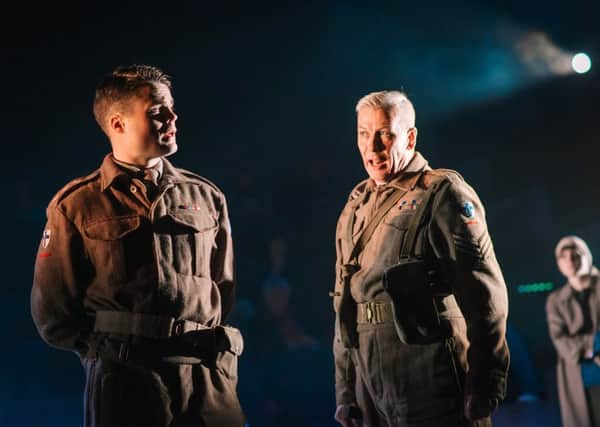Arts review of 2017: Joyce McMillan on the year in theatre


And in another sense, too, this has been a year of waiting on events elsewhere. Austerity in public spending is a many-faceted thing; there is austerity itself, now hitting Scottish local authorities particularly hard, there is austerity as a universal British management tool constantly used to drive down pay and expectations among artists, and there is the fear of austerity – and of savage cuts in arts budgets – which had been stalking Scotland’s arts scene like some kind of collective nightmare, in the run-up to Creative Scotland’s next three-year grants announcement. Words like “carnage” were bandied about in the press; and the mood did not lift until 14 December, when Scottish finance minister Derek McKay announced, as part of his annual budget, that Scottish arts spending by central government had once again been protected, with extra provision for the loss of funds under changed UK national lottery rules.
So did Scotland’s theatre-makers actually manage to produce anything, amid this unlovely landscape of perceived powerlessness and existential angst? They did, of course; and for Scotland’s four biggest building-based producing theatres – the Lyceum in Edinburgh, the Citizens’ in Glasgow, Dundee Rep and Pitlochry Festival Theatre – this has been something of a bumper year, with David Greig’s Lyceum, in particular, using a brilliant and absorbing programme of new and existing work to engage with the mood of the times.
Advertisement
Hide AdThe Lyceum year began with an absolutely beautiful and what now seems an oddly prescient production of Picnic At Hanging Rock from the Melbourne Malthouse and Black Swan theatre companies of Australia, then continued through fine productions of Douglas Maxwell’s Charlie Sonata, Caryl Churchill’s A Number, and Linda McLean’s Mary, Queen Of Scots play Glory On Earth, to an autumn season which featured both Chris Hannan’s superbly timely 2016 play about Enoch Powell, What Shadows, and a stunning post-Brexit revival of Cockpit, a 1947 play by screenwriter Bridget Boland about the post-Second-World-War refugee crisis, that transformed the Lyceum into a provincial German theatre being used as a transit centre for desperate people from all over Europe. The Lyceum also played host, once again, to Karine Polwart’s beautiful Midlothian solo-show-with-songs about the profound link between human beings and nature, Wind Resistance, now enjoying international acclaim after its 2016 Lyceum premiere.
The Citizens’ brought Zinnie Harris’s mighty modern rewrite of the Ortesteia to the Edinburgh Festival, revived Gareth Nicholls’s brilliant 2016 production of Trainspotting, and – in the autumn – staged gripping studio productions of The Macbeths, Dominic Hill’s brutal short bedroom take on Shakespeare’s tragedy, and Anders Lustgarten’s 2015 refugee crisis play, Lampedusa. Dundee survived a major change of leadership, culminating in the appointment of new artistic director and joint chief executive Andrew Panton, while creating unforgettable ensemble productions of Arthur Miller’s Death Of A Salesman and Brecht’s Arturo Ui (both brilliantly directed by Joe Douglas), Genet’s The Maids, and Panton’s debut show, August: Osage County.
And as artistic director John Durnin announced his departure after 15 years, Pitlochry staged an exceptionally rich programme of work with a running theme of class politics in the UK, ranging from Ayckbourn’s Absurd Person Singular to Peter Barnes’s The Ruling Class, and Peter Arnott’s exuberantly witty autumn adaptation of Compton Mackenzie’s Monarch Of The Glen. It’s striking that Pitlochry, the Scottish producing theatre least dependent on Creative Scotland subsidy, seems to sail serenely on through the funding crises that shake the rest of the scene, and consistently puts on stage casts of 14 or even 16 actors, at least twice the average of any other Scottish theatre.
Elsewhere, it was a superb year for touring theatre visiting Scotland, with the Festival Theatre playing host to Sally Cookson’s unforgettable touring version of Jane Eyre, and the world premiere of Music & Lyrics and Aria Entertainment’s new version of The Addams Family, a truly hilarious subversion of conventional ideas about American family life. The Playhouse, meanwhile, saw the Scottish premiere of Beautiful: The Carole King Story, and National Theatre director Rufus Norris’s electrifying version of Cabaret, starring Will Young and Louise Redknapp, with its chilling final warning against the rise of fascism in Europe.
Scotland’s own National Theatre had a relatively low profile year, as new artistic director Jackie Wylie settled into the job, but offered memorable Edinburgh Fringe productions of trans-gender stories Adam and Eve, by Adam Kashmiry and Jo Clifford, as well a powerful stage adaptation of Emma Donoghue’s Room, and the second part of its 306 trilogy, about the 306 British soldiers shot at dawn for desertion and cowardice during the First World War.
The Traverse, by contrast, seemed to find a new dynamism in 2017, playing host to or co-producing powerful new productions by Grid Iron (Jury Play), Magnetic North (Our Fathers) and, in November, Vanishing Point and the Scottish Ensemble, with the beautiful Tabula Rasa, inspired by the music of Arvo Part. The Traverse also produced Gary McNair’s Locker Room Talk, a rare direct response to the Trump sexual harassment scandal that went on to be performed at the Scottish Parliament; as well as McNair’s Fringe-First-winning show Letters To Morrissey, and, at the year’s end, Morna Pearson’s new Doric tragi-comedy, How To Disappear.
Advertisement
Hide AdThe touring Rapture Theatre scored a palpable hit with Sara Stewart’s wonderful performance as Martha in their fine spring touring production of Who’s Afraid Of Virginia Woolf?, the Bard In The Botanics company made Scottish stage history with Janette Foggo’s magnificent Queen Lear in Glasgow’s Botanic Gardens, and new festivals flourished, from Glasgow’s Take Me Somewhere to Edinburgh’s Hidden Door, now at the reborn Leith Theatre; suggesting that by hook or by crook, by excellent management or shoestring enterprise, Scottish theatre continues in rude health, searching for opportunities and inspiration, hugely varied in scale in style, and sometimes capable of stopping us in our tracks by reflecting our troubled times back to us, often from the angles we least expect.